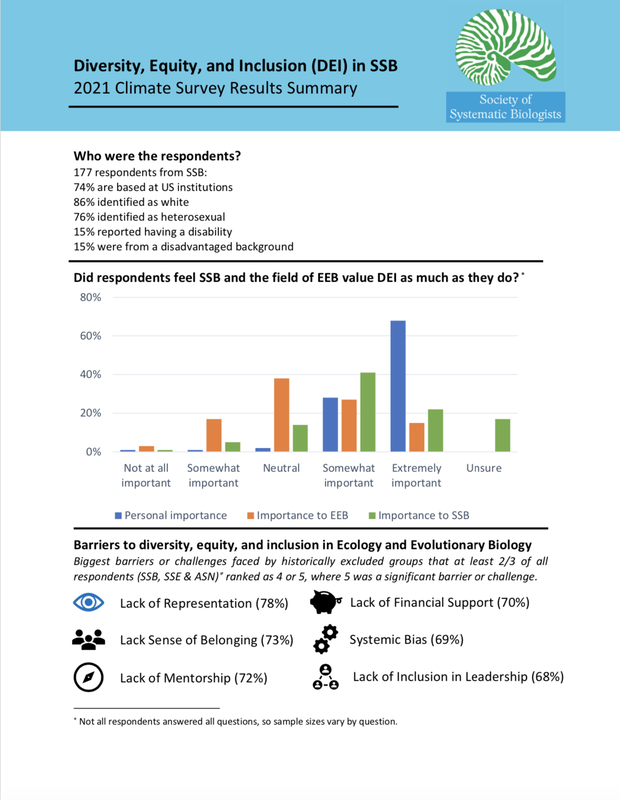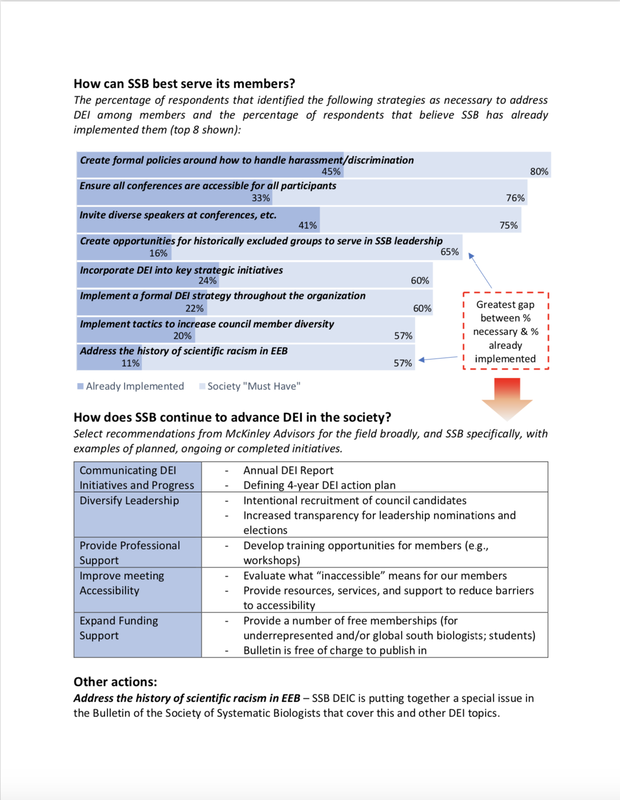Diversity, Equity, & Inclusion Committee
2021 Climate Survey Results Summary
About the SSB DEI Committee
|
The Society of Systematic Biologists Diversity, Equity, and Inclusion Committee (DEIC) is a standing committee within the society that works to promote diversity, equity, and inclusiveness to enhance the study of all fields in systematics, and to foster the career of early career systematists. A diverse and inclusive SSB will foster innovation, creativity, and inclusion at all professional levels. Through independent activities as well as activities in collaboration with diversity committees of the joint evolution societies, our goal is to promote the advancement of the study of systematics among underrepresented groups by supporting the inclusion and retention of individuals of all identity groups.
|
Current Members
|
Diversity Director: Dr. Anahí Espíndola
Anahí Espíndola (on leave until July 2024) is an Associate Professor in the Department of Entomology at the University of Maryland, College Park (USA). She is interested in understanding how the environment affects plant-pollinator interactions, and how this in turn modulates their ecology and explains their evolution. Anahí studied Biology at the Universidad Nacional de Córdoba (Argentina) and the University of Neuchatel (Switzerland). After her PhD, she worked at the University of Lausanne (Switzerland) and later became a Swiss National Science Foundation Fellow at the University of Idaho (USA). Anahí is a founding member of the Entomology Diversity, Equity and Inclusion group at UMD, and acts as a Faculty advisor for the UMD SACNAS chapter. Anahí is a strong defender of diversity in science. Her way of contributing to this is by focusing on developing paths to allow the professional success of low-income, first-generation, and culturally-diverse researchers. |
|
Acting Director & Committee Member: Dr.Timothy Colston
Timothy (Tim) Colston is an Assistant Professor and Director of the Genomic Resources Collection at the University of Puerto Rico at Mayagüez and research associate at the Smithsonian's National Museum of Natural History in the Division of Amphibians and Reptiles. His research focuses on the influence of the microbiome on reptile and amphibian evolutionary ecology and the systematics and taxonomy of Neotropical and Northeast African herpetofauna. Most recently he has been researching the interaction and effects of microbes of venom and co-founded the Initiative for Venom Associated Parasites and Microbes (iVAMP website: The Initiative for Venom Associated Microbes and Parasites). Tim holds BSc and Msc degrees from the University of Oklahoma and a PhD from the University of Mississippi. In addition to research, Tim is passionate about improving accessibility, equity and diversity in science and has served in various committee capacities to this aim at all of his previous academic appointments. An avid field researcher, he is passionate about educating and advocating for local indigenous communities through his outreach and research in the Neotropics and the Horn of Africa. |
|
Committee member: Dr. Manpreet Kohli
Manpreet Kohli is an Assistant Professor at Baruch College, City University of New York and research associate at the American Museum of Natural History. She is interested in insect systematics, macroevolution and phylogenetic methodology. Her research focuses on using phylogenomic methods to elucidate the evolutionary history of Odonata (dragonflies and damselflies), particularly species inhabiting colder climates. Manpreet finished her Bachelor’s in Technology in India before moving to United states where she received her Ph.D. in Biology from Rutgers University. Manpreet is committed to DEI and has championed and contributed to this cause throughout her career. She has worked on DEI initiatives for the Worldwide Dragonfly Association and Dragonfly Society of the Americas. Recently, with collogues she has started the Entomologists of Color initiative. |
|
Committee Member: Dr. Jimmy Bernot
Jimmy Bernot (he/him) is an assistant professor in the Department of Ecology & Evolutionary Biology at the University of Connecticut and a research associate at the Smithsonian National Museum of Natural History. Jimmy studies the systematics and evolution of parasites, especially copepods and other crustaceans. Previously, he was an NSF postdoctoral fellow at the London Natural History Museum, the Senckenberg German Center for Marine Biodiversity Research, and the Smithsonian National Museum of Natural History. Jimmy is passionate about science outreach and engagement. He has participated in WeRepSTEM, 500 Queer Scientists, LGBTQ+ StemCast, Biocord LGBTQ PRIDE in STEM, and the Smithsonian Pride Alliance. Outside of SSB, Jimmy has served on DEI committees for the Helminthological Society of Washington (HelmSoc) and the American Society of Parasitologists, and was a founding member of the Committee for [Underrepresented Minorities Research Awards for HelmSoc. He is committed to fostering diversity, equity, and inclusion at all levels and wants everyone to feel welcome and excited about nature and science! |
|
Committee Member: Dr. Liming Cai
Liming Cai is an Assistant Professor in the Department of Biology at the University of Florida. She is interested in the systematics and evolutionary genomics of plants, especially parasitic ones. She received a B.S. in life science from Fudan University, China and a Ph.D. in evolutionary biology from Harvard University. Liming was a Stengl Wyer postdoc at the University of Texas at Austin before moving to Florida. She works closely with the SAGES program at UT Austin to support women in science and mentors undergraduate students via the PLANTS program to broaden participation in plant science. |
|
Committee Member: Dr. Marco Pellegrini
Marco Pellegrini (he/they) is currently Quality Assurance Officer & Team Leader for RBG Kew’s Digitization Project, as well as Content Digitizer for the Plants of the World Online (POWO). Marco studies the systematics, evolution and taxonomy of aquatic and weedy plant groups, especially monocots and basal angiosperms. They previously were a postdoctoral research fellow at Museu Paraense Emilio Goeldi, in the Brazilian Amazon, after concluding their PhD at the Universidade de São Paulo, Brazil. During their PhD, Marco became very passionate about SciComm, teaching, and the connections between science and popular culture, starting the Plant Pokémon Project on Twitter. They have participated in BlackBotanistWeek and has been an active member of RBG Kew’s DEI/EDI program, acting as one of the co-chairs of the LGBTKew Staff Network, consulting for Kew’s highly praised Queer Nature Festival, co-writing Kew’s recent Trans and Non-Binary Inclusion Policy, and assisting with Kew’s SciComm and DEI/EDI external and internal comms. As a queer, mixed-race, disabled, immigrant, Latinx researcher, they have committed to ensuring that everyone feels welcomed, included and that they belong in science, research, and academia. |
|
Committee member: Rin Krichilsky
Rin Krichilsky (they/them) is a PhD student in Dr. Jessica Ware’s lab, joint between the American Museum of Natural History (AMNH) and Columbia University. Their research focuses on systematics and biodiversity of Apoid wasps and bees. Rin earned their BSc in Entomology at Cornell University in 2018, where they transferred to from a small liberal arts school. Between then and the start of their graduate journey, they worked at the Smithsonian Tropical Research Institute in Panamá, Academia Sinica in Taiwan, and the USDA in Utah, USA. They are passionate about ethics related to natural history collections and international research, which they promote and incorporate into their studies. With colleagues, they’ve co-founded an effort to attenuate language barriers in science by providing resources and editing and translation of academic materials. They have been active in DEI efforts across the institutions they’ve worked, such as the AMNH Pride group and youth mentorship programs. Rin is trans nonbinary and dedicated to advocating for safe and welcoming science, where all feel supported and can succeed. |










